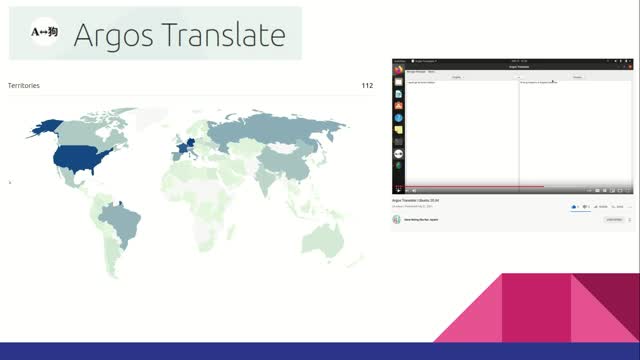Premium Only Content

Machine Translation in Argos Translate (2021)
Argos Translate: https://github.com/argosopentech/argos-translate
Argos Open Tech: https://www.argosopentech.com
LIbreTranslate Demo: https://libretranslate.com
Machine translation in Argos Translate, an open source Python library and Desktop application for doing neural machine translation.
Covers the sequence to sequence Transformer model, inference, data, data processing, tokenization, sentence boundary detection, package management, peer to peer distribution, web app, desktop application, API, and language bindings for Rust C# and NodeJS.
In this video we will be discussing machine translation in Argos Translate, an open source Python library and Desktop application for doing neural machine translation.
The heart of a modern machine translation system is a neural network that does sequence to sequence modeling, that is converting a sequence of tokens in the source language into tokens in the target language.
Human language is very nuanced and it would be extremely difficult for a programmer to write a set of rules to fully capture its complexity. Neural networks trained on a large amount of data are able to capture this nuance much better using a process that is roughly analogous to what neurons in our brains do.
Argos Translate uses Transformer models, a neural network architecture with an attention mechanism that can be trained in parallel more efficiently than past approaches. Models are trained using OpenNMT, an open source neural machine translation system.
To run the models Argos Translate uses CTranslate2 an optimized inference engine that supports both CPU and GPU execution. Fast CPU execution without the need for specialized hardware is important because it allows for simplified server deployment and local translations for enhanced privacy.
Argos Translate also supports pivoting through an intermediate language to perform translations that aren’t directly installed. For example, if Portuguese to English and English to Korean models were installed you could translate from Portuguese to Korean by passing through English.
Argos Translate has a desktop application based on PyQt and the LibreTranslate project has a web application.
The primary source of data for Argos Translate is the Opus parallel corpus which has compiled a number of open data sources in a standard format for easy access. Wiktionary definition data is also used.
The training scripts for Argos Translate load and filter the data for training. Emojis are removed from the training data to preserve emoji integrity in translations by preventing the sequence to sequence model from modifying them. There is also support for adding “special tokens” to the data to add functionality to the model. For example, the <define> token can be used with Wiktionary data to improve translation quality in languages without a large quantity of data available and to improve single word translations.
Finally, the training scripts package trained models in a standard format for use.
The sequence to sequence model operates on a series of discreet tokens. In theory you could make each character its own token. However, Argos Translate uses the SentencePiece tokenizer to split input text into sub-word tokens to take some of the burden of spelling words off of the sequence to sequence model. By splitting into sub-words instead of full words the sequence to sequence model is still able to understand uncommon compound words.
Currently the sequence to sequence model is only able to translate individual sentences meaning input text needs to be split into sentences. There are techniques for doing this effectively using periods, however, these techniques wouldn’t work for languages without periods. Instead Argos Translate uses Stanza which uses neural networks to do sentence boundary detection in a large number of languages.
Argos Translate has a package manager and package index with pretrained models. Trained models are packaged with metadata and the files needed by Stanza and SentencePiece for easy distribution and installation. Packages can either be installed manually from a file or automatically downloaded from the package index using the Python library or desktop GUI.
Packages have peer to peer links for downloading models using either IPFS or BitTorrent. Peer to peer distribution of models reduces the cost of distribution and is more resilient without a single point of failure.
LibreTranslate is an API and web app built on top of Argos Translate using Python and the Flask framework. LibreTranslate can be run from a Docker container and has language bindings for Rust, C#, and NodeJS. It also supports detecting languages, and text in scripts not present in the dataset such as Russian written using the Latin alphabet.
Together these projects provide a powerful, extensible, open source translation stack with many potential applications. What are you going to build with it?
CC0 1.0 Universal (CC0 1.0): https://creativecommons.org/publicdomain/zero/1.0/
-
 LIVE
LIVE
Lofi Girl
2 years agolofi hip hop radio 📚 - beats to relax/study to
195 watching -
 LIVE
LIVE
PandaSub2000
5 days agoLIVE 9:30pm ET | MADISON VR (The Scariest Game Ever Made)
96 watching -
 2:34:32
2:34:32
Badlands Media
4 days agoCODEX 9/11
253K180 -
 1:53:43
1:53:43
Nerdrotic
5 hours ago $0.24 earnedMysteries of 3I/ATLAS | Forbidden Frontier #113
35.1K3 -
 2:04:21
2:04:21
vivafrei
1 day agoEp. 278: D.C. Peace Wave! Big Tish & Nipple Judge SPANKED! "Maryland Man" Trafficker FREE & MORE?
79.1K91 -
 LIVE
LIVE
Damysus Gaming
1 hour agoBorderlands 3 - Part 8 - FL4K Time | Children of the Vault be Warned!
48 watching -
 LIVE
LIVE
Patriots With Grit
4 hours agoWhat You Should Know About Harmful Vaccine Ingredients And What To Say To Your Doctor, Pediatrician, Health Department or School When They Pressure You, Your Kids Or Your Family Members | Dr. Bryan Ardis, D.C.
306 watching -
 LIVE
LIVE
This is the Ray Gaming
1 hour agoSunday Night Live with the Boys | Rumble Premium Creator
44 watching -
 LIVE
LIVE
ItsMossy
1 hour ago🍃NEW MIC WHO THIS🍃DRIVING SIM GO BRRR🍃420 SESH🍃
18 watching -
 LIVE
LIVE
THOUGHTCAST With Jeff D.
1 hour agoSunday night Fortnite With ScottishVikingGaming & crew
24 watching